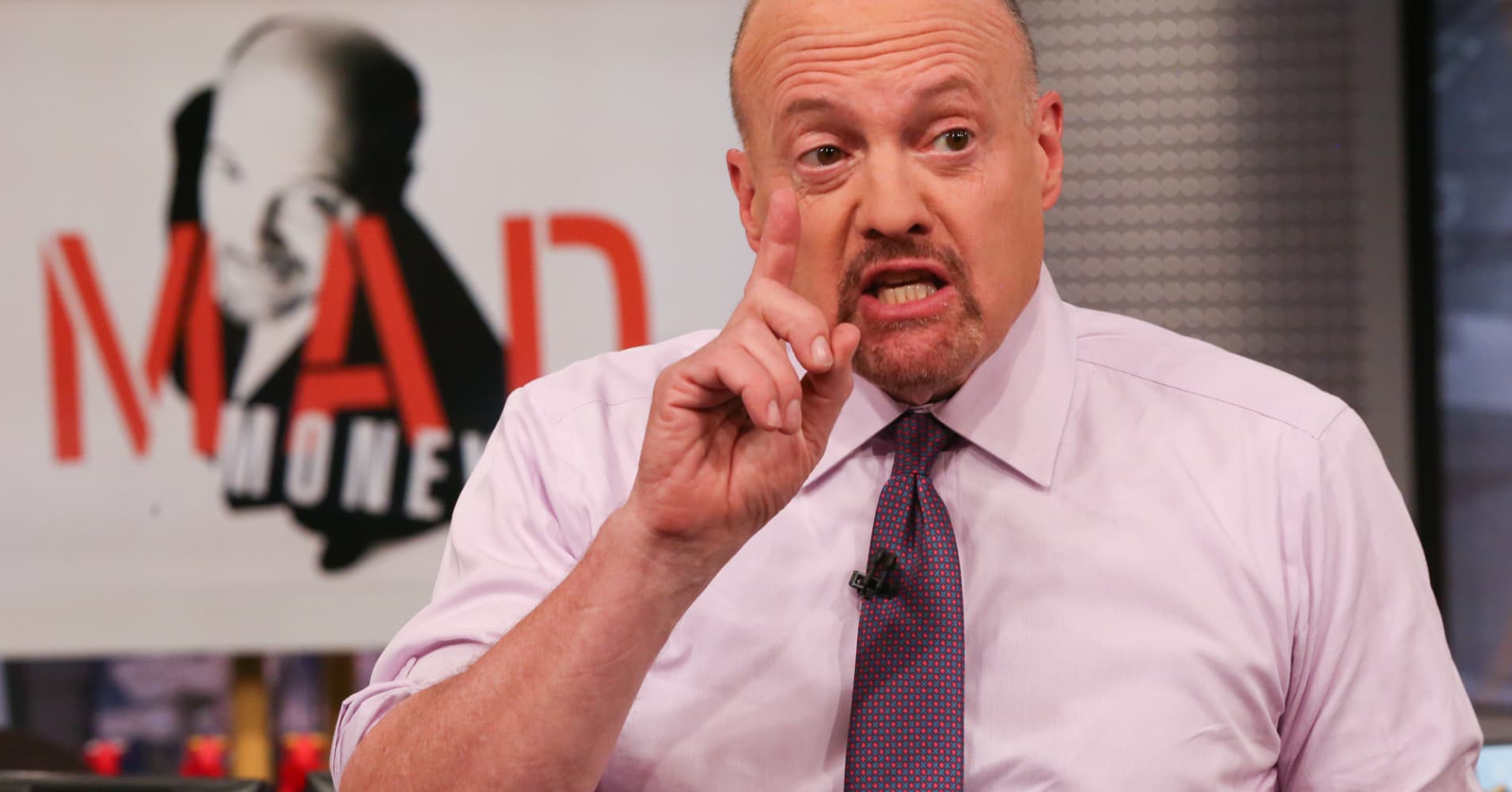The stock market’s positive response to a report that U.S. officials were considering lifting tariffs on China to get a trade deal was telling, but it wasn’t necessarily good, CNBC’s Jim Cramer said Thursday.
“Stocks that had been crushed on Chinese worries roared higher like this arrangement was already a done deal” despite the report being anonymously sourced, Cramer noted. “Even when we got contrary reports later in the session that perhaps there might be no deal, these stocks held onto most of their gains.”
So, while the market’s optimism can make you money, Cramer wouldn’t try to build a strategy around trade talks, especially with all the conflicting reports.
“I think it’s a sucker’s game to try to predict anything that goes on in Washington,” the “Mad Money” host said. “It’s pure chaos down there right now.”
Still, the late-2018 breakdown left the market so undervalued that “it feels dangerous not to buy stocks” at these levels, even if their catalysts are “nothing to write home about,” Cramer acknowledged.
“When you see this kind of positive action, you need to recognize what’s driving it. In the fourth quarter, stocks got way too cheap, and that overreaction to the downside has created incredible values that give investors a sense of certainty — they know they won’t be blown out if they buy something because there’s only so much much downside from these levels,” he explained. “When you have that sense of certainty, it’s very easy to pull the trigger and buy, which is why 2019 is turning out to be a much better year than many investors expected.”
Click here to read more.
Large gold producers combining forces — like Newmont Mining buying Goldcorp and Barrick Gold scooping up Randgold Resources — are “on the right track,” Tony Makuch, who runs competitor Kirkland Lake Gold, told CNBC on Thursday.
In a “Mad Money” interview, Makuch reminded viewers of how his own company was formed: via a three-way merger in 2016 that combined what was then known as Kirkland Lake Gold with competitors Newmarket Gold and St. Andrew Goldfields.
“We were able to put ourselves in a position where we could now invest differently and look at our mines differently. We were able to close some mines that were non-profitable and take a step back and reinvest in them. We had the capital resources available to us. We had more money,” the CEO explained. “I think that goes for the larger players as well.”
Click here to watch his full interview.
The “multiplier effect” of the ongoing government shutdown is not to be discounted, Cramer argued Thursday as stocks rose on reports that U.S.-China trade tensions could ease amid negotiations.
With 800,000 federal workers missing their paychecks, “you’ve got an uninsured hurricane going on and we don’t know when it will end or how much damage it will do,” Cramer said. “The insanity of the shutdown just cannot be grasped.”
The implications of hundreds of thousands of people falling off the spending grid could soon extend to travel, leisure and retail, as well as the utility space as bills go unpaid, the longtime market-watcher said.
And even though company executives are increasingly saying that they have seen “no significant slowdown” in their businesses as a result of the shutdown or the late-2018 market weakness, there’s more to those words than meets the eye, he said.
Click here for Cramer’s take on how investors should hedge against the potential weakness.
There’s a big difference between cloud-based software-building platform Appian Corp. and the rest of its competitors, the company’s founder, chairman and CEO Matt Calkins told Cramer in a Thursday interview.
“Everybody understands that Low Code” — Appian’s specialty — “is easy and it’s fast and it makes applications quickly,” Calkins said. “What they don’t understand is Low Code can be a great way to build a powerful application.”
That’s how this $2 billion company, which competes with the likes of Salesforce.com and IBM, was able to secure a high-profile client like Goldman Sachs, which has historically been notorious for keeping its software operations in-house.
“A client like Goldman or Dallas-Fort Worth, they wouldn’t want to build an application unless it was powerful. Everything they do is mission-critical,” Calkins said. “So the fact that they would choose our platform says something about the substance that we’re offering.”
Click here to watch Calkins’ full interview and hear how he thinks the shutdown will affect Appian’s earnings.
In Cramer’s lightning round, he shared his responses to callers’ stock questions:
GW Pharmaceuticals PLC: “I’ve got to tell you: I thought that, with all of the legal cannabis floating around, these guys would not be recognized, but the stock is coming back. Remember, they are the ones that the doctors can prescribe because it’s a uniform amount of cannabis, and that’s what’s bedeviled all the cannabis companies. So I can understand why that stock could go higher from here.”
Brink’s Co.: “I think this Brink’s went down ridiculously. I thought it was a great quarter. I think this stock is a buy. There was really no reason for it to sell of whatsoever. It’s really good.”
Disclosure: Cramer’s charitable trust owns shares of Salesforce.com and Goldman Sachs.
Questions for Cramer?
Call Cramer: 1-800-743-CNBCWant to take a deep dive into Cramer’s world? Hit him up!
Mad Money Twitter – Jim Cramer Twitter – Facebook – InstagramQuestions, comments, suggestions for the “Mad Money” website? madcap@cnbc.com

